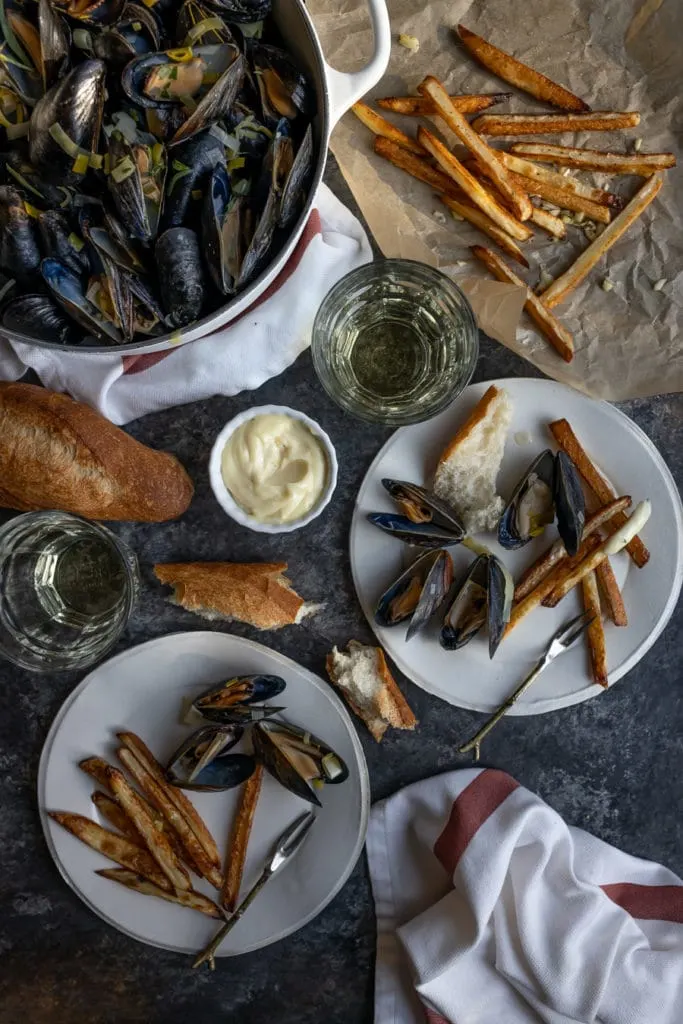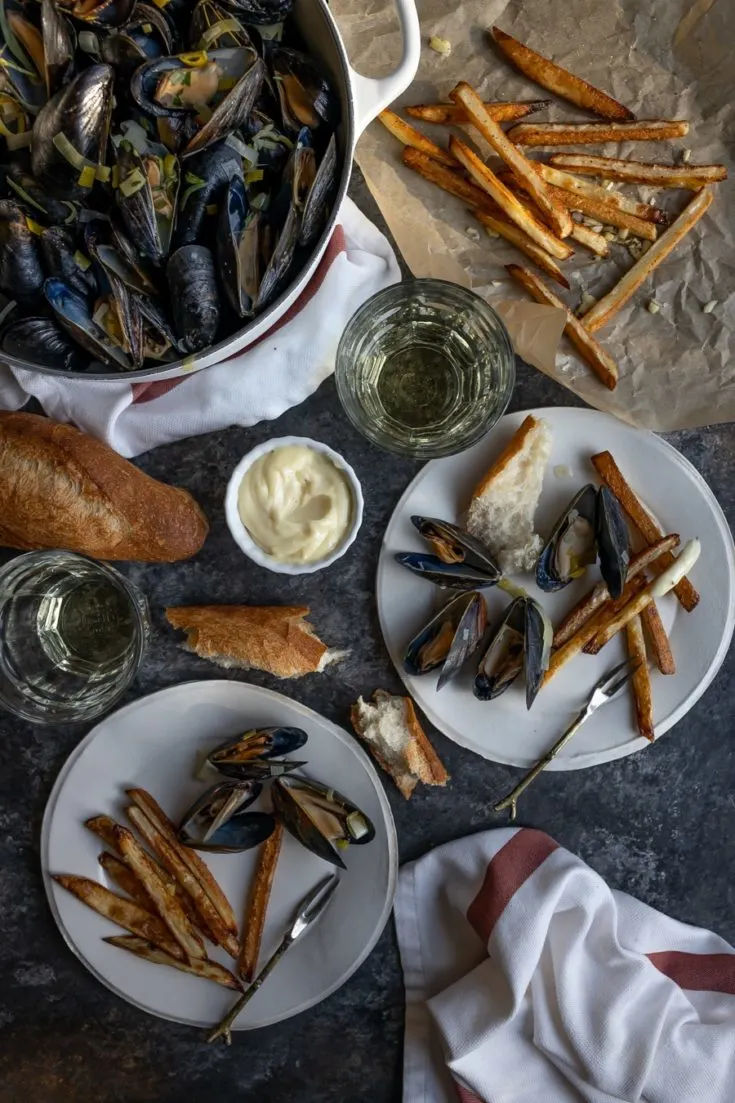Classic Moules Frites is one of those dishes that I usually enjoy at a little bistro in Paris even though it is a dish traditional to Belgium. My recipe is definitely one of those travel dishes that I look forward to when on holiday. What makes my Classic Moules Frites recipes classic? I use ingredients that were used in the most memorable Moules Frites that I have enjoyed when in France as well as Belgium.

The first time I had Moules Frites I was in Belgium during my early twenties. A heaping bowl of steamy mussels drenched in a wine sauce along served next to a big bowl of crispy fries. Don’t forget that side of mayo that arrived at our table, and forever changed my obsession with mayo drenched French fries. We were wide-eyed and very hungry. Everything about that dish was perfect. Warm, and engaging by sharing a meal from one bowl and light and refreshing in taste. I was hooked.
Over the years and many bowls of moules frites I have found out that the secret ingredients are a touch of dijon, lots of aromatics such as leeks, fresh thyme, and tarragon, as well as a good knob of butter. Never tomatoes and never cream. Years later while visiting friends in Brussels they took us to a little spot known for their moules frites, all of the bowls arriving at the table were made the same way and our waiter told us to NEVER put tomatoes or cream into the mix when I asked for the recipe. Even butter was optional. I like butter so I add it at the very end.
With Valentine’s Day around the corner, we have been talking about what meals we consider romantic. It cannot be a dish that takes too much time nor will leave you feeling stuffed. Moules Frites comes up during every conversation as it is light as well as flavorful and it is very simple to make.
Tips:
- Start the French frites before cooking the mussels. They do not take long and this way you will have crispy and hot fries to serve alongside the mussels.
- Serve with a side of mayonnaise or aioli like they do in Belgium and France.
Cleaning and De-bearding Mussels: my fishmonger sells their mussels already cleaned, but if they didn’t I would use the following steps to do so. If your mussels are cleaned when you purchased them, be sure to place them in a colander and rinse them off under cold water as there could be sand on the outer shells.
- Place the mussels in a colander in the sink and run cold water over them.
- Using a clean scrubbing brush (I have one for vegetables that I use) rub off any debris like seaweed, sand, barnacles, or mud spots that may be on the shells.
- If you find any mussels with open shells, lightly tap them against the side of the sink. If it does not close up toss it.
- The clump of hair-like fibers that may be sticking from the shell is called the beard. You want to remove this. Grab the beard with your fingers and tug it towards the hinge of the mussel shell. It should pop off. If it doesn’t you can use a sharp knife to gently remove it.
Cleaning leeks:
- Remove the tough and dark green bottom of the leek. I only use the light green and white part.
- Cut the leek down the middle lengthwise.
- Under running water hold the leek with the white part up and slighting spread apart the leek to really clean. Let the water run through it until it is clear and free of sand. Overwatering is better than sand with your leek slices.
- It is okay that the leek is wet as the water will help when cooking the leeks.
Tools:
- A deep saucepan or dutch oven to cook the mussels.
- A well seasoned baking sheet for the fries. I have found that I can get super crispy French fries using a baking sheet that is well-seasoned. I have a really old one that is blackened that I only use for roasting vegetables that work perfect. I do not get the same result from the baking sheets I use for cookies.
- Pat the potato slices very dry using paper towels or a very clean kitchen towel. I have separate flour sack towels that I use for this purpose as well as for baking bread.
More Easy to make Fish Recipes
Classic Moules Frites

Easy recipe for making Classic Moules Frites at home. The broth is lightly seasoned with aromatics and wine, which let's the taste of the mussels shine.
Ingredients
- Frites:
- 2 medium russets, peeled and thinly sliced into French fry size
- 1 tablespoon canola oil
- 1 small garlic clove, finely minced
- fresh ground black pepper
- Maldon salt
- Moules:
- 1 1/2 pounds mussels
- 2 medium leeks, thinly sliced, just a little over 2 cups
- 1 teaspoon olive oil
- 2 1/2 teaspoons fresh garlic, finely minced
- 6 sprigs of fresh thyme
- 3 small sprigs of fresh tarragon
- 1 teaspoon dijon
- 1 1/4 cups dry French white wine
- 4 tablespoons unsalted butter
- 3 tablespoons fresh parsley, finely minced
Instructions
Prepare Frites:
Preheat the oven to 425.
Pat the potatoes dry with paper towels.
Place the potatoes into a medium-sized bowl, add the canola oil along with a generous grind of black pepper. Using your hands mix together.
Place the potato slices onto a baking sheet spaced apart from each other.
Bake for 15 minutes. I start checking after 10 minutes as you do not want them to get too crispy or burned. Every oven is different.
Flip over and then bake another 10 minutes or until golden brown and crispy. Again, pay attention to make sure they do not burn.
About 2 minutes before removing from the oven toss the French fries with the minced garlic.
Remove from the oven and season to taste with Maldon salt.
Prepare the Moules:
Place a very large pot over medium-low heat.
Add the olive oil and the leeks. Stir and cook for 3 minutes.
Add the garlic, thyme, tarragon, and dijon. Stir and cook over low heat for 5 minutes.
Add the wine and continue to cook over low heat for about 8 minutes to evaporate the alcohol taste from the wine.
Add the mussels, cover with a lid and let steam over low heat until the shells pop open. Depending on the heat of your stove this could take 3 - 5 minutes.
Remove the mussels from the pot and place them into a serving dish.
Bring the nectar - the juices from the mussels along with the wine - to a boil over medium heat. Whisk in the butter and the parsley just until the butter is melted.
Pour the sauce into the mussels.
Serve.
Eat.
Notes
Want to learn how to clean the mussels? Refer back to the post on Chez Us.

